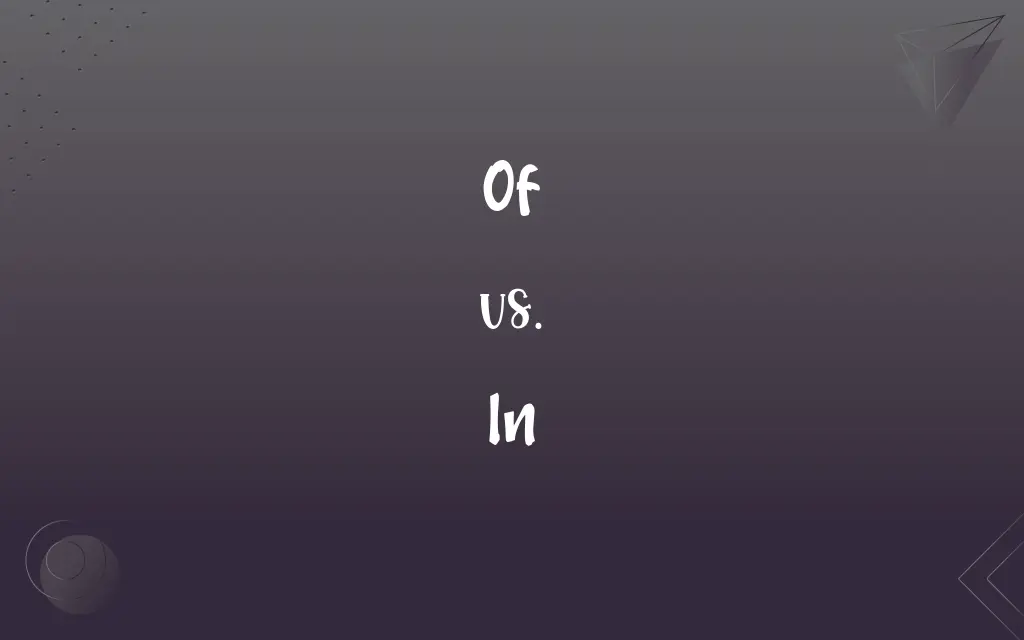Of vs. In: What's the Difference?
Edited by Aimie Carlson || By Janet White || Published on December 9, 2023
"Of" indicates belonging or a relationship, while "in" denotes location or position within something.

Key Differences
'Of' is used to show possession, origin, or relation, as in "the color of the sky". 'In' indicates location or position, as in "sitting in the chair".
'Of' often denotes belonging, like "a member of the team", while 'in' is used for circumstances or states, such as "in trouble".
'Of' can express a part of a whole, for example, "a piece of cake", whereas 'in' is used to denote a period of time, like "in the 1990s".
'Of' is often used in idiomatic expressions, such as "of importance". 'In' is commonly used to express being part of a group or category, as in "in the same category".
'Of' can also indicate a specific attribute, like "a man of honor", while 'in' might indicate a state or condition, such as "in love".
ADVERTISEMENT
Comparison Chart
Primary Use
Indicates belonging or relationship
Denotes location or position
Example in Context
"The pages of the book"
"The book in the library"
Expressing Time
Less common, more abstract
Commonly used, e.g., "in April"
Idiomatic Usage
Frequent, e.g., "of interest"
Also frequent, e.g., "in time"
Relation to Groups
Describes belonging, e.g., "one of"
Describes inclusion, e.g., "in a group"
ADVERTISEMENT
Of and In Definitions
Of
Of denotes origin or source.
She is a citizen of Canada.
In
In is used for expressing a period of time.
I'll finish the work in an hour.
Of
Of can express what something consists.
A bouquet of flowers.
In
In denotes location or position within something.
The pen is in the drawer.
Of
Of indicates belonging or a relationship.
The leg of the table was broken.
In
In can indicate inclusion within a group.
He is in the choir.
Of
Of can denote a part or a portion.
A piece of the pie.
In
In can indicate a state or condition.
She is in love.
Of
Of is used to indicate a specific attribute.
A person of integrity.
In
In is used in idiomatic expressions.
In the long run, it will be beneficial.
Of
Derived or coming from; originating at or from
Customs of the South.
In
Within the limits, bounds, or area of
Was hit in the face.
Born in the spring.
A chair in the garden.
Of
Caused by; resulting from
A death of tuberculosis.
In
From the outside to a point within; into
Threw the letter in the wastebasket.
FAQs
Is 'of' used to express time?
Rarely, it's more abstract in time expressions.
What does 'of' primarily indicate?
'Of' primarily indicates belonging or a relationship.
Does 'of' indicate origin?
Yes, 'of' can denote origin or source.
How is 'in' commonly used?
'In' is commonly used to denote location or position.
How does 'in' express time?
'In' is used to denote specific times, like months or years.
Can 'in' indicate a condition?
Yes, 'in' can indicate states or conditions.
Does 'in' express inclusion in a group?
Yes, 'in' is used for inclusion, like "in a team".
Can 'of' and 'in' be used interchangeably?
No, they serve different grammatical purposes.
How is 'in' used in idiomatic expressions?
'In' is used in phrases like "in time" or "in a nutshell".
Can 'of' be used to express a relationship?
Yes, it can express relationships or connections.
Is 'of' used in expressions of quantity?
Yes, like "a cup of tea" or "a group of people".
Is 'of' used in partitive expressions?
Yes, 'of' often indicates a part of a whole.
Is 'of' used in possessive constructions?
Yes, 'of' indicates possession, as in "the sound of music".
Can 'in' denote a state of action?
Yes, 'in' can indicate being engaged in an activity.
How does 'of' work in idiomatic usage?
'Of' forms phrases like "of importance" or "of late".
Is 'in' used for spatial relations?
Yes, 'in' is often used to describe spatial relationships.
Does 'in' ever indicate a manner?
Occasionally, as in "in a hurry" or "in a quiet manner".
Does 'of' ever imply cause or reason?
Sometimes, in expressions like "died of hunger".
Can 'of' denote a specific attribute?
Yes, 'of' can indicate a particular quality or attribute.
Can 'in' be used for temporal relationships?
Yes, it's commonly used for time, like "in the future".
About Author
Written by
Janet WhiteJanet White has been an esteemed writer and blogger for Difference Wiki. Holding a Master's degree in Science and Medical Journalism from the prestigious Boston University, she has consistently demonstrated her expertise and passion for her field. When she's not immersed in her work, Janet relishes her time exercising, delving into a good book, and cherishing moments with friends and family.
Edited by
Aimie CarlsonAimie Carlson, holding a master's degree in English literature, is a fervent English language enthusiast. She lends her writing talents to Difference Wiki, a prominent website that specializes in comparisons, offering readers insightful analyses that both captivate and inform.







































































